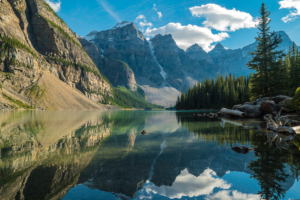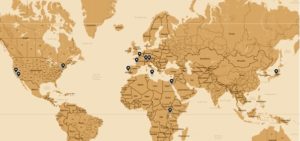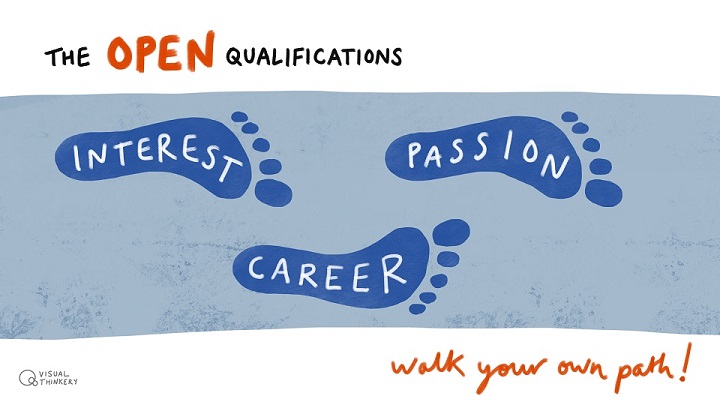 Gina Sharp is the Open Programme Co-ordinator in Access, Open and Cross-curricular Innovation team. In this post, Gina reflects on a staff-student online drop-in session held on Tuesday 21st April 2020.
Gina Sharp is the Open Programme Co-ordinator in Access, Open and Cross-curricular Innovation team. In this post, Gina reflects on a staff-student online drop-in session held on Tuesday 21st April 2020.
Whilst we are currently confined to our homes during the Coronavirus epidemic, the thoughts of places that we have travelled to in the past, or hope to travel to in the future, can be a cheerful thing to meditate on!
This was the latest topic on the table at our Open Programme student/staff drop-in. We began by thinking about the inspiration for travel – why do we go to the places we go to? What is our hope in travelling further afield than our normal sphere? The discovery of new sights, sounds, smells and experiences seemed to be high on our list. Finding out about the world we live in; the cultures, dress, food and atmosphere of new places. The idea of being immersed into new cultures is appealing and helps to broaden our life experiences.
More than one of the attendees had lived overseas as youngsters and so the experience of travel was somehow different for them. Even though she lived in Africa as a child, one of the students would write letters home saying how she longed to explore. Another lived in Rhodesia/Zimbabwe but never recalled going to the tourist attractions. One of my colleagues recalled living in Papua New Guinea and Indonesia, wearing batik clothing and flip-flops every day. We seemed to be an extremely well-travelled group! However, this is all very different from the experiences of those of us who had only holidayed in the UK as children – caravan holidays to Devon & Cornwall and Wales were fondly recalled! People who have experienced living in very different cultures that would be perfect holiday destinations for others of us, who said, “we never went to the things that were on our doorstep.” My Dad, having never set foot on a plane in his entire life states, “why do you need to get on a plane and travel for hours and hours, when there are great beauties to see in the country you live in?” Scotland is one of those places and yet I have only ever been once. Recommendations for places to visit in Scotland were quickly forthcoming, including Edinburgh, the Outer Hebrides (Harris and Lewis) and the Isle of Skye.
Images also play a large part in tempting someone to travel. The images for our session comprised a perfect turquoise sea with palm trees waving along a pier, and another of large jagged mountains, reflected in a crystal-clear lake. Someone remarked, “I would so like to be there now!” One of our students is a keen photographer and said that the image made him want to travel to that place, capture his own image from his own angle and put his own stamp on it. It was agreed that pictures of beautiful scenery do a lot to reel us in and make us want to travel there.

One of the students had worked extensively in the travel industry and because of this was never inspired to travel because she equated these beautiful places with work, and maybe didn’t appreciate them as places where life experience could be enhanced. This also prompted the thought that we are now in the Instagram age where everyone on holiday seems to be viewing life through the screen of a smartphone. Can these people really be experiencing a place to its fullest?
We do also sometimes have expectations of a place – we have seen pictures of it or seen it in the movies – and sometimes the reality is not what we expected, both in a positive and a negative way. I recall being in Rome and visiting the Colosseum (which it is the law to do when in Rome!) Having seen it so many times in pictures, although I was impressed by it, it wasn’t until I stood inside and heard through the guide about its history and the many things that had happened there, that I began to properly appreciate and understand its importance. We also talked about places that we have been told are amazing, only to visit them, and find them ‘normal’ and nothing to ‘write home’ about!
We went on to try and answer the question, “what is your favourite place? Someone felt that this was an unfair question, a bit like asking which is your favourite child! They were all favourites but for different reasons. Sharm el Sheik for the diving, Japan for the amazing culture, Swiss Alps for its beauty etc. One of the attendees also commented that the people you met on your travels made such a difference as to whether a place became a favourite or not. One of our students, a wheelchair user, has travelled to many places and had experienced places that were very inaccessible, but the people had been so kind and helpful that that place ended up being a favourite. He highlighted Rome and Malta as examples of this.

We decided to add these favourite places to a Padlet map as a visual tool to see what parts of the globe as a collective we had covered.
We then asked the group if they had any travel tips and they came up with the following:
- Find out where the locals eat! Try food that you wouldn’t normally eat.
- Take a chance, be adventurous, get out of your comfort zone, wander down that back street, who knows what you will find?
- Always know where your passport is!
- Don’t spend too long arguing and deciding about where to go – decide a plan in advance and stick to it, otherwise you can waste valuable time.
One attendee spoke about the joy of travelling on your own as you can do exactly what you want to – travelling with others can sometimes mean dragging people along who are heavier than your suitcases!
We ended the session by reflecting on how travel might change after this season of global crisis. It appears that there will definitely be a new dawn of travel. Business travel surely will change as companies have been forced to enable their staff to work from home, and, surprisingly enough(!), it turns out that this can be done effectively and on a large scale. Will companies still be willing to spend a lot of time and money on international travel, when the same meeting could be held and decisions made over the internet?
It was felt that values will be different after this – hopefully reflected by more patience in travelling. We also referred briefly to the impact that the Coronavirus has had on pollution levels across the world, with many countries such as China and Italy seeing a massive improvement in their air quality.

Will this change the way we think about flying? Will we want to return to the same polluted world that we had before? Unfortunately, it was suggested that human nature will never change and the first thing many people will want to do once this is over will be to hop on a plane and travel to some of their favourite places. This will, of course, result in a travel overload causing a carbon crisis and the environment will take a big hit.
However, perhaps we can hope that as this epidemic has reminded us of what is most important in life, we will reflect on this time and try to be kinder and better stewards of what we have, and will work out new and different ways of experiencing the amazing world we live in.
